The Kipi Chick on Becoming a Professional Musician Later in Life
It's Never Too Late to Start Your Musical Journey (or Change Directions)
Meet The Kipi Chick, aka Penny Rushing of Montague, Michigan. Penny was told in the 7th grade that she wasn’t good enough to be in the school choir. At the age of 40 her husband took her to the music store and told her to pick out whichever ukulele she wanted. Seven years of struggles and successes later, Penny performed at her first open mic night event.
The grandmother of three currently performs at local venues, private parties, weddings, festivals, and community events. She writes and performs her own songs, and she even hosts and runs sound for the open mic nights where she first began performing. This last summer she started a community ukulele club that she leads weekly, welcoming all ages and ability levels including beginners.
As a former New Horizons band director (band program for older adults) I have many memories working with musicians who were returning to playing an instrument after not playing an instrument for 30 years or more. Many left music behind when beginning a life filled with family and career obligations, and there just aren’t many amateur opportunities for playing instruments in adulthood related to skills taught in a school setting where a conductor or director does all of the planning, managing, and directing of musical decisions.
Also joining my New Horizons bands were those learning an instrument for the first time as an adult, many not having had the opportunity, social support, and/or desire to play an instrument in school. Others may have started an instrument in school, but then quit for a lack of enjoyment, belonging, or success. Then, there are those who wanted to play an instrument such as piano or guitar, both possibly not available in their school program.
Regardless of their background and skill level, most new members arrive questioning their instrument playing ability and potential. I understood the importance of helping new band members to establish a belief in their ability to successfully contribute to the band, and be accepted by their peers, within the first couple of weeks to reduce the chance of their discontinuing participation.
One new band member challenged my philosophy of being an encouraging and open-minded director, conductor, and teacher. A semi-retired woman in her sixties arrived at her first New Horizons band rehearsal holding a clarinet case. She was smiling ear to ear while putting her clarinet together, the same one she played in high school, and she appeared ready to take on the world. I was delighted to see that in her excitement she would not need much, if any, confidence coaching. With her clarinet in hand, and an expression full of hope, she asked me, “Do you think that soon I could make the Symphony?” referring to a local semi-professional symphony in our area.
How would you answer her question? If you even hint that making the semi-professional symphony orchestra is unlikely, and give her all of the reasons why, you take away all of the excitement and anticipation that she has for playing the clarinet again. If you give any answer implying yes with encouragement, you risk her not trusting you later after she will likely realize the limitations that she faces, which are perhaps less of her own limitations and more so of the system, but nonetheless there are limitations.
But, what if? What is possible? When is “Too Old to Go Pro”?
How do we avoid letting our own limitations and perceptions negatively affect the lives of those around us, especially those that we serve as teachers and leaders? The world is full of people who have accomplished things that no one else believed that they could, and also full of people who tell us what we can’t do.
Pursuing a Music Career Later in Life
I first met Penny at an open mic night at Fetch Brewery in Whitehall, Michigan. I was there to observe the musicians and how they learn, perform, engage, and improve as a part of my pursuit to experience and learn from music learning outside of the institutional walls that framed most of my life. While I was standing in the back of the room, Penny came up to me and introduced herself saying that she felt compelled to say hello as I reminded her of a friend she had in school. Earlier that evening she sang cover tunes by 4 Non Blonds, Vance Joy, and David Bowie while accompanying herself on ukulele. I asked her where she learned to sing, and she laughed, followed by an explanation that she was self taught.
She then shared with me her story about being told by the choir teacher that she wasn’t good enough to be in the 7th grade choir in the large school that she attended in western Michigan. As a music educator, hearing her story was painful. Middle school and junior high school choirs are for teaching the art of singing. What skills was the choir director expecting at this level, and where does one learn then if they aren’t accepted into a public school 7th grade choir program?
Unfortunately, negative school music experiences are not uncommon. I hear the personal stories of difficult school music experiences from friends and acquaintances outside of the music world, from students in my music classes, and from responses to surveys that I administered to college education students. Every new story makes me cringe and question some of our processes and approaches in school music education. While these negative music education experiences have the potential to deter students from continuing music in school and later into adulthood, Penny sought out to live a musical life without the support of a public school music program. This led her to experiencing and sharing music in ways that perhaps we can all learn from.
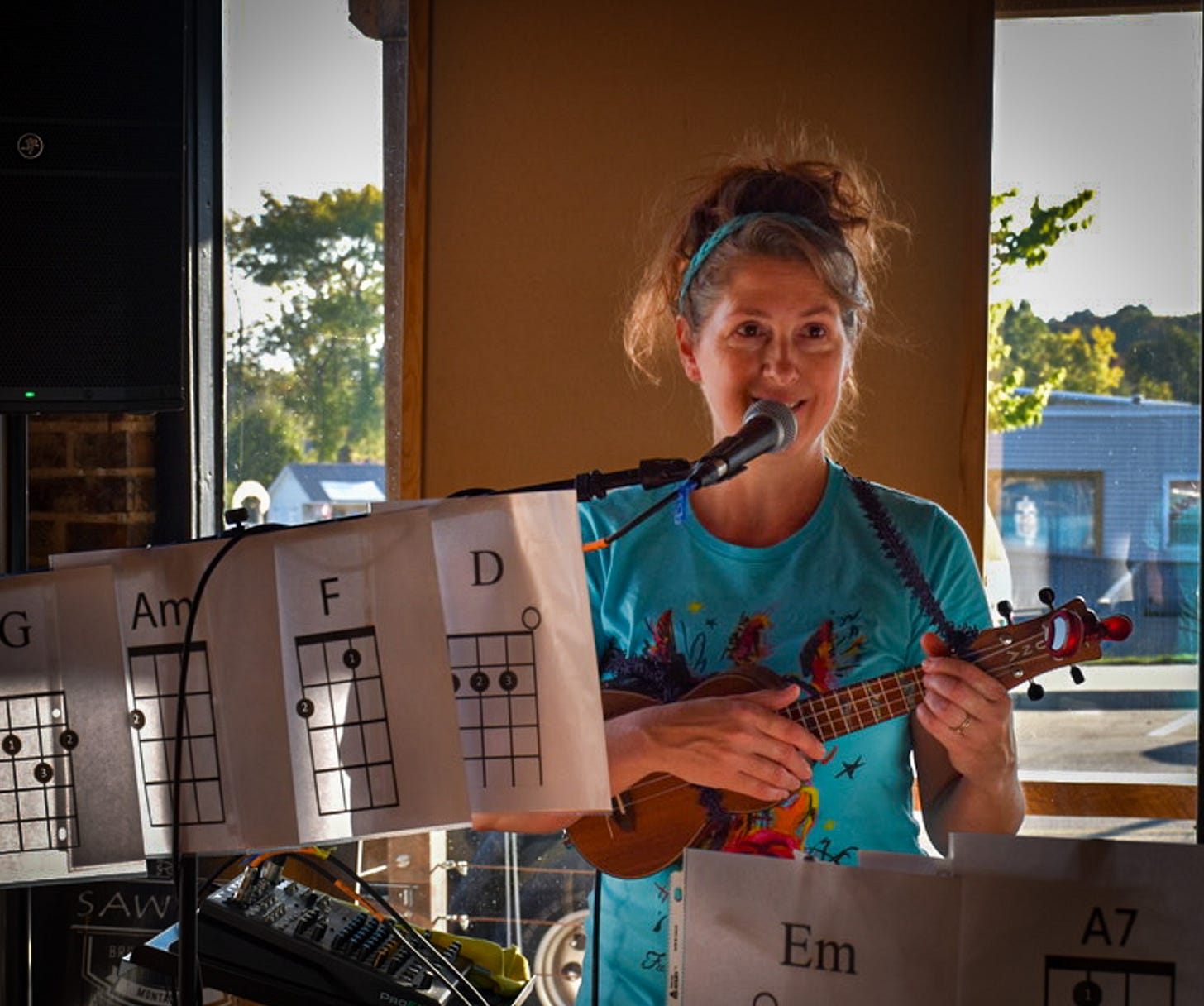
Penny shares her journey with us, encouraging anyone harboring an unrealized passion to stop procrastinating and take a step on a new path.
Erin: How did you begin playing the ukulele?
Penny: Cheyne (Penny’s husband) surprised me with a trip to Elderly instruments in Lansing for my 40th birthday. He said I could pick out whatever ukulele I wanted! You know how he can play so many instruments … and I couldn’t play even one! I had always told him that I’ve always wanted to be able to play the ukulele, but I don’t read music. I don’t know music theory. But, the first step was getting a ukulele for me. I was super excited to finally have one, but the books all were in sheet music… although they did have the chords listed above some of the notes, I didn’t understand what the other symbols meant. I’m trying to read the explanations in the books, but it just didn’t make sense to me.
I tried learning from some YouTube “tutorials”, but I really felt left in the dark as to what they were doing. It just felt like they automatically assumed I had an understanding of what they’re talking about … how to strum, how to hold it, what fingers to use, what each chord shape was, etc. It was SUPER frustrating, I knew there was something I was missing, but I had no idea WHAT IT WAS! (If I KNEW what it was, I wouldn’t be MISSING IT, right????) So I tried multiple times over 7 years to figure out how to play it, which only ended in my frustrated, heartbroken disappointment and putting it away again. It just broke my heart.
Cheyne had taken a course online at Udemy.com on how to play the flute, and he said they have some courses on how to play the ukulele. He suggested that I pick one out and take it. So in January, 2019, I looked through some of the sneak peek videos from the classes and picked out a course called “The Ukulele Academy” and blew through it in a day or so. The instructor explained everything from the beginning, the parts of a ukulele, how to hold …. the how’s and why’s and simple steps to practice with play alongs. And something CLICKED — by the end of the class I could play the basic, most popular chords, and while I could only do downstrums, they explained how to read the explanations for different strumming patterns! It was choppy and clunky at first — trying to get the hang of chord changes quickly, but at least I UNDERSTOOD IT NOW!! I grabbed my “I’m Yours” music and was like, OMG I CAN PLAY THIS NOW!!!!! At that point it was just the music, and it was just down strums, but at least I was making the music!!
It took me 2 months to figure out how to sing and strum at the same time, and I did my first open mic at Fetch in May (2019)… was it pretty and perfect? Absolutely not! Did I have the most fun in my life ever??? YES! OMG I WAS HOOKED! And from there I just had this hunger for “what else can I learn, what else can I do???” I had this hunger for the challenge of each new song, and the excitement from the accomplishment of learning each song!! It was like the floodgates opened up and I’ve just been swept away. I have a LOT of lost time to make up for!!! I’m constantly looking up songs to learn. It used to take me a month or two (sometimes more) to learn a song (and still does if it’s highly complicated) but now it’s almost second nature and I can pick up some new songs in just hours!

Erin: What have been your toughest hurdles, and how did you move past them?
Penny: Mastering how to sing and play at the same time. When practicing, I'd ask those around me, do you see the smoke coming out of my ears? If I can't figure it out, I just try to keep at it, but sometimes I just have to walk away from a song, and come back to it a few months later. "Riptide" is one that took a while to figure out. The strumming pattern was so different -- I just couldn't get it, so I put it away, and I think it was almost 3 years later that I pulled it back out and I'm like, okay, look at that. I can do it now!
Erin: It sounds like you are developing new skills with each tune.
Penny: Yeah, then you think maybe if a song is just too hard for me, I'll just kind of put it on the back burner and come back to that in a couple of months. You know, working on other songs, in the meantime, you're going to be learning a lot of other chords and strumming patterns that might open that door, or kick that door open even, to the prior strumming that you couldn't get.
Erin: If I asked you about your most meaningful experience since you've been playing ukulele, does anything come to mind?
Penny: Playing songs with my family and other people. I think being able to play along with my kids and husband. He'll play harmonica or flute or violin or something. There's some songs that we're working on together. It's just fun, you know? And we're hoping that when the grandkids grow up they will play with us too. Last year for Christmas our grandson Noah got a ukulele. One day I brought my ukulele over with me to play and when he saw mine, he ran to get his, and he just sat next to me on the couch, happily plucking on the strings as I played, we just had the best time. That's where it is. That's right. To be able to do that with my family.
I missed out on 47 years of being able to do that, you know? And I wonder how much better would I be at this if I just figured it out much earlier, you know, how much more would I know?
I think about maybe the reason why I'm doing so much, but having so much fun with it, is because I had felt like it was never going to happen. It was like a pain in me, the thought that learning to play the ukulele was just never going to happen. So when I finally DID figure it out -- I had just this fire and hunger for playing it. I don't know that I would have been as passionate if it had come easy to me in the beginning.
Erin: How have the relationships in your life been changed after making this musical journey?
Penny: I have met so many people that I wouldn't know if it wasn't for getting out and putting myself out there. There's a wonderful classical guitarist, David Martin, who plays here, and in the beginning, he invited me to come in to play for 10-15 minutes between his sets. He's played his music so beautifully, and here I come with these spunky little songs and people are like, "Oh my!" and just very complimentary of my music. It felt good! David has become a good friend, and with his encouragement, and with Sawyer's being so open and welcoming, saying, "Hey, whenever you want to play, you just let us know.". Things like that just help so much to change your inner voice, the way you talk to yourself, you know what I mean? In my head I'd be thinking, "Oh, you shouldn't do that. That's not what YOU do. Who are you, trying to come in here and play ukulele?". Who am I to come in here and say "Listen to me."? Music is such a unique language, not just for those who play, but for those who listen, it can speak to the soul and you make those connections with people. I have made so many new friends that I wouldn't have ever had, if I had never learned the ukulele.
Erin: How much is performing a part of your life now?
Penny: In July of 2021 I was invited to play music (10-15 minute sets) between David Martin’s classical guitar sets at Sawyers. They had said anytime I wanted to play there it was fine with them. I asked if I could play on a Sunday afternoon and they said, “Yes,” and I’ve been playing there almost every Sunday afternoon since September of 2021. I’ve since added hosting their monthly open mic nights and hosting my own Strum It White Lake! community ukulele club.
In addition to Sawyers and Fetch, I have also played gigs at The Book Nook, The Golden Sands Golf Course and Bucket Bar, private weddings, a luau at the White Lake Yacht Club. I have also participated in The Muskegon Street Performers and Walk the Beat White Lake music events, and performed for the local artisan market. I continue to attend and perform at Open Mic nights in the White Lake/ Muskegon area regularly. It's such a great way to meet other musicians who just want to share their love of music, whatever that looks like to them, wherever they're at on their musical journey. Being open and vulnerable, and putting yourself out there... there's nothing like it.
Erin: How have you managed anxiety in public performing?
Penny: To help me mitigate my anxiety, I remind myself of what people came here for, to hear music. I’m just doing my job in delivering them the song as confidently and as perfectly as I can every time. And, if I DO mess up, I just keep going, most times people don’t even notice if I had a mistake in there. If it WAS a big obvious train wreck at the end of the song, I just kind of laugh about it with the audience like — what in the world happened? I’ll say, “I guess that’s how you know it’s liiiiiive muuuusic!”, While doing my best “jazz hands”.
I think because of my age I just kind of A) Don’t care what people think enough to stop me from getting out there and trying, and B) I figure I only have twenty good years left to make this music thing happen for me, so there’s no time to waste!
Erin: What would you like others to know about taking risks in pursuing a passion?
Penny: Don’t give up. The motivation to keep trying for me was … maybe, just MAYBE … THIS TIME I WOULD GET IT!!! THIS TIME I would figure it out!! Maybe. Then there is the excitement when I realize that I can do this, like I can make music! Yeah. And when I learn a new song, and then the first time I make it through playing that song in public without screwing it up, it feels good.
Notes on Becoming a Musician Later in Life
Thoughts from Penny’s experiences:
Hear your own voice first. Penny had a voice inside her that was stronger than the voice of the 7th grade choir teacher who told her that she wasn’t good enough. Her own voice also serves as encouragement to continue on her chosen ukulele path when others ask her why she doesn’t play the guitar. Part of Penny’s confidence comes from knowing who she is and what she wants to do as part of presenting herself authentically.
It’s never too late. Penny didn’t receive her first ukulele until the age of 40, and even then it was almost eight years before her first public performance at an open mic night. To be human is to be musical, and age does not define our human or musical spirit.
Don’t give up, have patience and persistence, and try different approaches. Your timeline is unique to you, as is your preference for learning style. Penny tried different learning approaches before she found the class that set her up for success. She would often put a song aside after struggling to find success. Then, when she would pick up the song at a later time, she found that her continued work on other songs now gave her the skills to play the song that she had set aside.
Appreciate and enjoy the process as much, or even more than, the achievements. The eight years that Penny experienced between purchasing a ukulele and her first performance were not wasted. The journey led to new experiences, new relationships, and a new perspective for approaching each new day that all contribute to well-being and thriving in life.
The real joy is in pursuing personal meaning and purpose. In many ways Penny’s journey is still just beginning as she is now pursuing new ways to connect and share with others. Creating the community ukulele club, mentoring other musicians who are just beginning their musical path, and planning performances at care centers and nursing homes are ways that she uses music to serve others. Some may view a successful performance as an arrival, or perhaps as an accomplishment or celebration of hard work. For others, it’s just the beginning of what is possible.
Activity:
Challenge 2024
I challenge you, dare you even, to pursue something musically this year that is motivated by an inner voice, somewhere from the depths of your soul, an idea that has been with you perhaps for years, but one that you continuously bury under the louder, maybe more prominent voices coming at you from outside.
Is there something that you are supposed to do, but you keep quieting that voice, even ignoring it, out of some fear that you might be made uncomfortable? Life is not supposed to be comfortable. Sing a song, even if someone once told you that you couldn’t sing. Play an instrument that someone else said you shouldn’t play. Or write a song even if you sometimes think that you can’t. Find something musical inside you, something authentic and untouched by the opinions of others, and let it out.
Embrace that you are human which means that you are both inherently musical and inherently flawed. Here is the secret…make music for someone else, with someone else, and use your song to make a difference in the lives of others. Anxiety and doubt reside in a focus on self. It’s not about perfection, it’s about serving others. Through serving you will find your true spirit of musicianship.
Share in the comments below something new and adventurous that you are willing to try musically this year, or share this article with a friend and encourage each other to follow through on your one step forward:


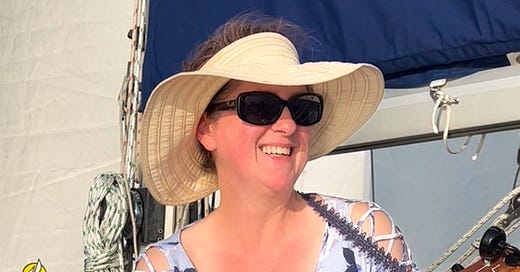



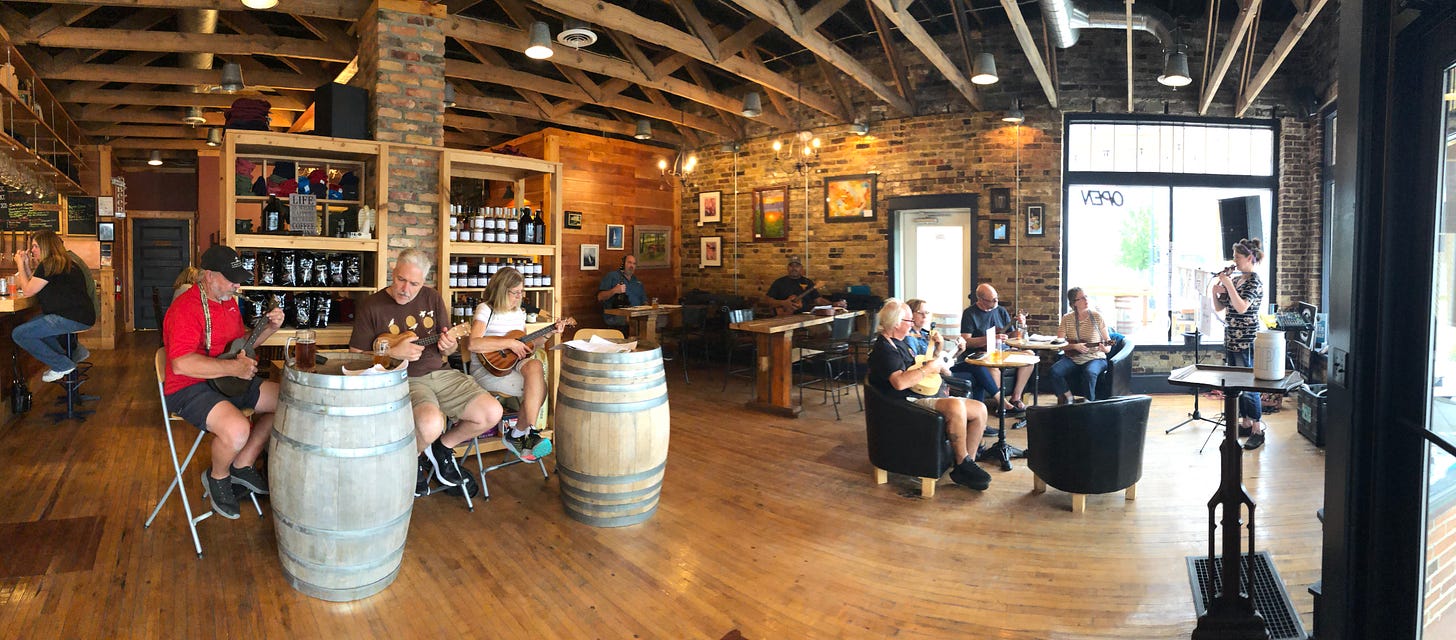
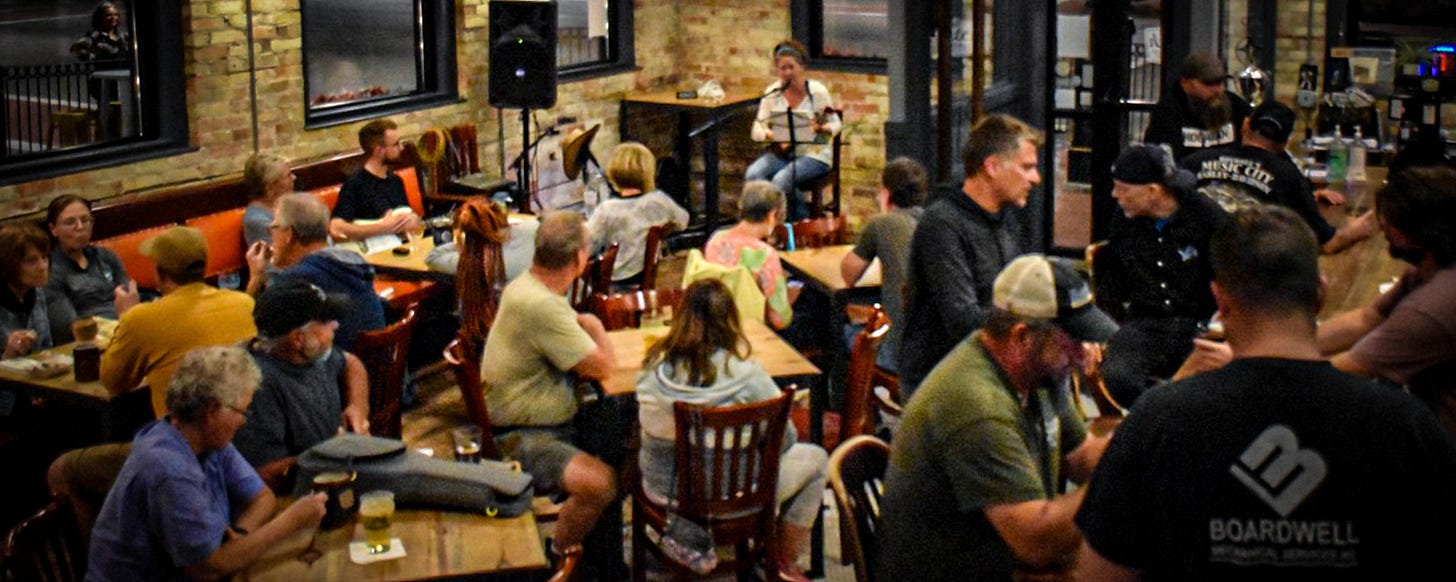
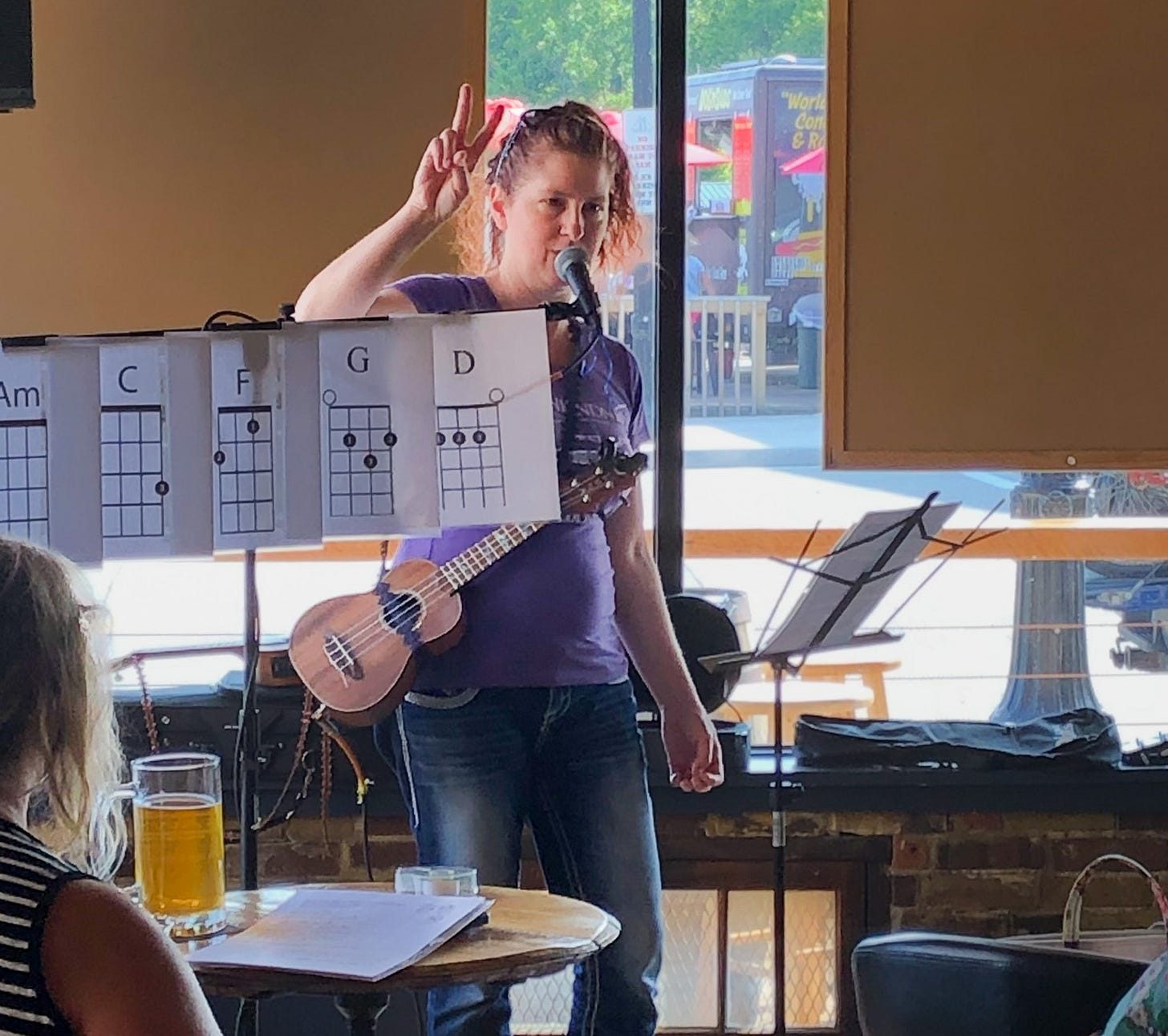
What a wonderful story. I love hearing about the musical success and of finding that inner song that has developed into an external success in front of audiences.
My story - I was in band in junior high and high school. It was my favorite class. Especially marching band. While I loved it I wasn’t all that good and my parents did not have the resources for private lessons. Thankfully we had inspiring band directors who encouraged everyone even if they were like me only average.
When high school was over so was my musical career - well other than listening to the stereo as the requirements of college and a career took priority.
Well 45 years later as I was approaching retirement I expressed that I’d always harbored a fantasy of being able to play the piano. Both our kids had lessons and one had become a music education major in college. We’d had a piano in the house that had sat untouched for over 20 years because I’d never acted on that fantasy.
With retirement nearing additional hobbies were needed. My wife actually called me on that expressed fantasy by buying an inexpensive keyboard. And my music major daughter gave me a gift of some lessons with a school colleague. Ok now I had to put up or shut up.
I called the teacher, scheduled the trial lessons. And I absolutely loved it. She told me I practice more than any other students. The difference is I’m doing this because I want to not because like many new students, their parents are making them.
My early thought was that success would be defined by being able to play a decent rendition of Mary Had A Little Lamb.
Well a few years in and I have continued advancing to the point that a keyboard with 60 keys and not foot pedal wasn’t sufficient. So I purchased a full piano.
It’s been a little over 4 years, I’m still taking lessons, still love it, practice every day and yes I have advanced well beyond Mary Had A Little Lamb.
Listen to that song in your head. If you’ve always wanted to try playing, what’s holding you back? And being near retirement is not and excuse to not do it, it is the perfect opportunity to start and to help keep an aging brain working and an aging body coordinated.
That left had doing one thing, the right hand another, the the feet yet something else really is good mental exercise.
Great article Erin. I saw so much of my own musical journey in there. Being frustrated with my slow learning progress, finding the ukulele later in life by complete accident and realizing that I loved playing this instrument, discovering an accepting community of amazing and encouraging ukulele musicians, that had always been there, but that I hadn't known about, even well after I began learning and playing and now hoping that I can help propagate this same interest in others and help bring them into this almost unlimited world of musical and community experiences. My journey continues and I'm excited about its possibilities for self-improvement and for helping others achieve their goals and maybe even join in world out there that I've found and love. Thanks for sharing this article and your friend's story with us.